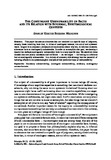| dc.creator | Medeiros, Stanley Kreiter | |
| dc.date.accessioned | 2019-03-13T14:36:11Z | |
| dc.date.available | 2019-03-13T14:36:11Z | |
| dc.date.issued | 2017-11-01 | |
| dc.identifier.citation | MEDEIROS, Stanley Kreiter Bezerra Medeiros. The contingent unknowability of facts and its relation with informal, epistemological contexts. Principia an International journal of epistemology, n. 1, v. 21, p. 61-76, 2017. | pt_BR |
| dc.identifier.issn | 1414-4217 | pt_BR |
| dc.identifier.uri | http://memoria.ifrn.edu.br/handle/1044/1628 | |
| dc.description.abstract | This paper focuses on elements that are involved in a specific type of judgment,
namely, those involving facts that, in virtue of contingent reasons, are out of our epistemic
reach. Its goal is to propose a philosophical explanation about why we, in informal contexts,
take some facts as contingently unknowable. In order to accomplish that goal, we develop a
theory that defines contingently unknowable facts in a very specific way. We establish three
clauses that are jointly necessary and sufficient — so we argue — for taking an arbitrary
fact as contingently unknowable. In a variety of contexts, this strategy has the potential of
reducing efforts in an epistemological analysis of this particular type of unknowability | pt_BR |
| dc.language | por | pt_BR |
| dc.publisher | Instituto Federal de Educação, Ciência e Tecnologia do Rio Grande do Norte | pt_BR |
| dc.relation.ispartof | Principia: an internationnal journal of epistemology | pt_BR |
| dc.rights | Acesso Aberto | pt_BR |
| dc.subject | Necessary unknowability | pt_BR |
| dc.subject | Contingent unknowability | pt_BR |
| dc.subject | Evidence | pt_BR |
| dc.subject | Contingency | pt_BR |
| dc.title | The contingent unknowability of facts and its relation with informal, epistemological contexts | pt_BR |
| dc.type | Artigo de Periódico | pt_BR |
| dc.publisher.country | Brasil | pt_BR |
| dc.publisher.department | Ceará-Mirim | pt_BR |
| dc.publisher.initials | IFRN | pt_BR |
| dc.subject.cnpq | CNPQ: CIÊNCIAS HUMANAS | pt_BR |
| dc.citation.volume | 1 | pt_BR |
| dc.citation.issue | 21 | pt_BR |
| dc.citation.spage | 61 | pt_BR |
| dc.citation.epage | 76 | pt_BR |
| dc.description.resumo | This paper focuses on elements that are involved in a specific type of judgment,
namely, those involving facts that, in virtue of contingent reasons, are out of our epistemic
reach. Its goal is to propose a philosophical explanation about why we, in informal contexts,
take some facts as contingently unknowable. In order to accomplish that goal, we develop a
theory that defines contingently unknowable facts in a very specific way. We establish three
clauses that are jointly necessary and sufficient — so we argue — for taking an arbitrary
fact as contingently unknowable. In a variety of contexts, this strategy has the potential of
reducing efforts in an epistemological analysis of this particular type of unknowability | pt_BR |




